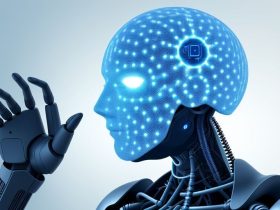Artificial Intelligence (AI) is no longer a futuristic concept—it’s here, and it’s transforming the way we live, work, and interact with technology. Whether you’re a complete beginner or someone curious about how AI works, this guide will walk you through the basics, applications, and future of AI in a simple and engaging way. Did you know that AI-powered systems can now diagnose diseases with accuracy comparable to human doctors? This is just one example of how AI is revolutionizing industries. Let’s dive into the world of AI and explore what it means for you.
What is Artificial Intelligence?
Artificial Intelligence, often abbreviated as AI, refers to the simulation of human intelligence in machines that are programmed to think, learn, and make decisions. These machines can perform tasks that typically require human intelligence, such as recognizing speech, solving problems, and even playing complex games like chess or Go. AI is not a single technology but a collection of techniques and algorithms that enable machines to mimic cognitive functions.
Types of AI
AI can be broadly categorized into three types:
- Narrow AI: Designed for specific tasks, such as voice assistants like Siri or Alexa.
- General AI: A theoretical form of AI that can perform any intellectual task a human can do.
- Superintelligent AI: An advanced form of AI that surpasses human intelligence in all aspects.
Currently, we are in the era of Narrow AI, with researchers striving to achieve General AI in the future.
How Does AI Work?
AI systems rely on data and algorithms to function. Here’s a simplified breakdown of the process:
- Data Collection: AI systems require vast amounts of data to learn and make decisions.
- Data Processing: The data is cleaned, organized, and prepared for analysis.
- Algorithm Application: Algorithms, such as machine learning models, are applied to the data to identify patterns and make predictions.
- Output Generation: The AI system produces results, such as recommendations, classifications, or decisions.
For example, AI-powered recommendation systems on platforms like Netflix analyze your viewing history to suggest shows you might enjoy.
Applications of AI in Everyday Life
AI is already integrated into many aspects of our daily lives. Here are some common applications:
- Healthcare: AI is used for diagnosing diseases, predicting patient outcomes, and personalizing treatment plans.
- Finance: AI helps detect fraudulent transactions, manage investments, and provide personalized financial advice.
- Retail: AI powers chatbots, personalized shopping experiences, and inventory management systems.
- Transportation: Self-driving cars and AI-powered traffic management systems are becoming a reality.
These examples highlight how AI is making life more efficient and convenient.
Why is AI Important?
AI is a game-changer for several reasons:
- Efficiency: AI automates repetitive tasks, saving time and resources.
- Accuracy: AI systems can process large datasets with minimal errors, leading to more accurate results.
- Innovation: AI drives innovation by enabling new products, services, and business models.
- Problem-Solving: AI can tackle complex problems that are beyond human capabilities, such as climate modeling or drug discovery.
As AI continues to evolve, its impact on society and the economy will only grow.
Getting Started with AI
If you’re interested in learning AI, here’s a step-by-step guide to get started:
- Learn the Basics: Familiarize yourself with fundamental concepts like machine learning, neural networks, and data science.
- Choose a Programming Language: Python is the most popular language for AI development due to its simplicity and extensive libraries.
- Take Online Courses: Platforms like Coursera, edX, and Udemy offer beginner-friendly AI courses.
- Practice with Projects: Apply your knowledge by working on small AI projects, such as building a chatbot or image recognition system.
- Join AI Communities: Engage with AI enthusiasts and experts through forums, meetups, and online communities.
Remember, learning AI is a journey, and consistency is key.
Challenges and Ethical Considerations
While AI offers immense potential, it also comes with challenges and ethical concerns:
- Bias: AI systems can inherit biases from the data they are trained on, leading to unfair outcomes.
- Privacy: The use of personal data in AI systems raises privacy concerns.
- Job Displacement: Automation powered by AI could lead to job losses in certain industries.
- Regulation: There is a need for clear regulations to ensure the responsible use of AI.
Addressing these challenges is crucial for the sustainable development of AI.
The Future of AI
The future of AI is both exciting and uncertain. Here are some trends to watch:
- AI in Healthcare: AI will play a bigger role in personalized medicine and early disease detection.
- AI and Sustainability: AI can help address global challenges like climate change and resource management.
- AI in Education: AI-powered tools will transform how we learn and teach.
- Ethical AI: There will be a greater focus on developing AI systems that are fair, transparent, and accountable.
As AI continues to advance, it will shape the future in ways we can only imagine.
Conclusion
Artificial Intelligence is no longer a distant dream—it’s a reality that’s reshaping our world. From healthcare to finance, AI is making a significant impact across industries. As a beginner, understanding the basics of AI is the first step toward unlocking its potential. While challenges like bias and privacy remain, the future of AI is bright, offering endless possibilities for innovation and growth. Whether you’re looking to start a career in AI or simply want to stay informed, now is the perfect time to explore this fascinating field. The journey into AI is just beginning, and the opportunities are limitless.
“`












Leave a Reply